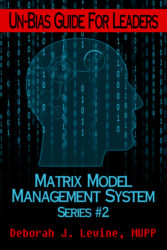EQ & DEI
 The Matrix Model Management System is a copyrighted process that includes an innovative approach to Emotional Intelligence. A major element in dealing with micro-aggressions is the ability to manage the emotional reactions. Because of the growing emphasis on diversity, equity and inclusion, this is increasingly necessary. Plus the need for emotional intelligence (EQ) is greater than ever given the level of anxiety post-COVID. If we’re going to move forward productively together we will need to boost our EQ and learn to apply it effectively.
The Matrix Model Management System is a copyrighted process that includes an innovative approach to Emotional Intelligence. A major element in dealing with micro-aggressions is the ability to manage the emotional reactions. Because of the growing emphasis on diversity, equity and inclusion, this is increasingly necessary. Plus the need for emotional intelligence (EQ) is greater than ever given the level of anxiety post-COVID. If we’re going to move forward productively together we will need to boost our EQ and learn to apply it effectively.
We cannot afford to have the workplace rendered dysfunctional. Therefore, this webinar assists in developing the environment needed today and in the future.
Who benefits?
The presentation is designed for leaders and aspiring leaders of diverse teams who want to lead creative and innovative collaborations.
The Problem: Microagressions
A DEI look at how cultural expressions can cause intentional or unintentional insults often based in unconscious bias, cultural clash, or personality differences .
Methodology #1: Emotion Metrics
Introduction to measuring emotional states and creating a common language in the process.
Methodology #2: Conflict Management
Matching conflict management strategies with emotion metrics to avoid impasse and engage productively.
Hands-on Exercises and Takeaways
- Individual exercise:
Build your personal Barometer with Emotion Metrics and use neuro-science to embed its use into your brain. - Team exercise:
Apply Emotion Metrics and Conflict Management Strategies to team collaboration.
Presenter:
DEBORAH LEVINE is a Forbes Magazine Diversity And Inclusion Trailblazer and an award-winning author of 15 books on cultural diversity. And she is Founder/Editor-in-Chief of the American Diversity Report. Deborah has 33 years experience as a speaker and coach for government agencies, corporations, universities ad nonprofits. She’s the inventor of the Matrix Model Management System, an interactive tool kit that using neuroscience strategies. Because of her pioneering work, Deborah has won national and international awards.
PARTICIPANT COMMENTS ON TAKEAWAYS
- EQ is about strategy. Don’t let emotions take over.
- Avoid Impasse and nightmare – how to take a step back, assess, breathe before taking action. Also going over how silence and humor can be received differently.
- We can develop strategies for communicating and assessing. emotional states. These can help in conflict or when dealing with others who are in heightened emotional states.
- As a leader make sure you are checking in with your group and that everyone is in a positive and good place working.
- You need to communicate in the right style for the context/area you are in. How to redirect if someone calls you something that you feel uncomfortable with. Write down your reflections for learning.
- The polls were interesting ways to have to identify oneself, and working through the matrix was also a good exercise – particularly the association with music.
- Everyone is different in the way they handle their stresses.
- Reminder to think about the emotional diversity of the team.
- Tracking where I am at and evaluating how to avoid escalation
- To create the context when asking question.
- Tactics for how to deal with uncomfortable situations.
- Building awareness of your emotional state helps yourself and your team.
- I liked the idea of thinking about EQ as broken down into 4 categories. Easier to think about and understand.
- Check in with yourself where you are at, pause more frequently, find common ground.
- Chill out, check your bias, reframe.
- Developing a metric to check in and track to help develop awareness and ways to “move up in zones”.
- Your emotions and those of others are important to consider when working in teams.
- How to consider emotion.
- That emotional intelligence is something you can skill up, but it takes time to build that habit.
- That Emotional Intelligence is related to understanding others, and their life context.
- Learning about my areas that I”m most comfortable and the difference between a 1 and 4.
- Strategies for measuring your feelings.
- The short-hand point system for addressing discomfort.
